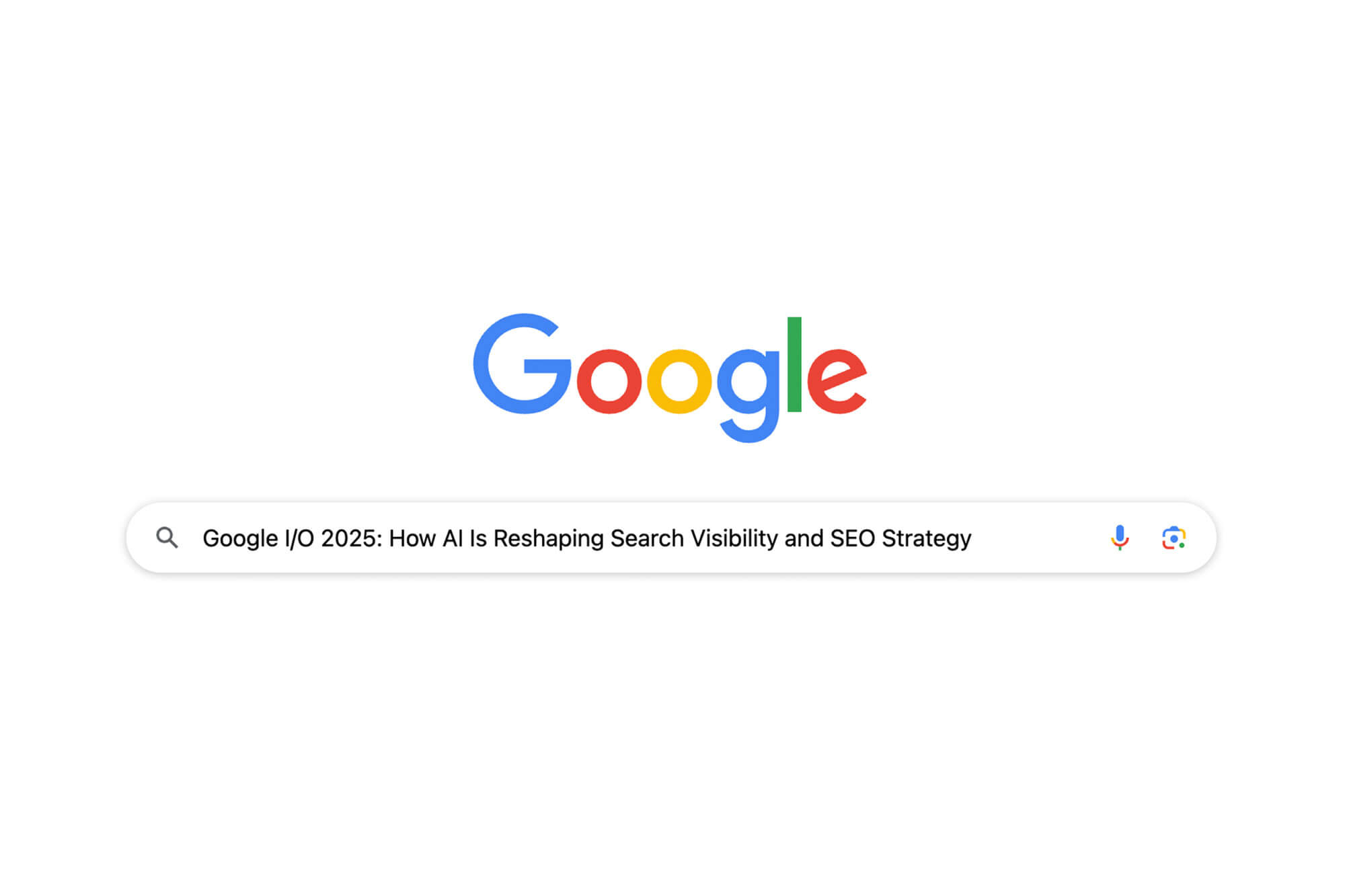Google I/O 2025: How AI Is Reshaping Search Visibility and SEO Strategy
Google I/O 2025 left no room for doubt - the era of AI-first search is here.

Through major updates to its Gemini model, the global rollout of generative AI Overviews, and the introduction of a new conversational search experience known as AI Mode, Google indicated a seismic shift in how it processes, prioritises, and presents information. The impact on brands, marketers, and SEO professionals is enormous.
Ranking on page one is no longer an effective search strategy. To generate results today, your content must be understood by machines, detected by algorithms, and favoured by AI-generated summaries.
So, what does this mean for your business? Read on to find out - and discover how to stay visible in the AI-first future of search.
Goodbye Keywords, Hello Context
A well-thought-out keyword strategy has long been the foundation of traditional SEO. Identify the right terms, match search intent, optimise accordingly, and away you go.
But with generative AI now summarising results directly on the search page, the days of keyword dominance are over.
Google's Gemini-powered Overviews collate answers from multiple sources into a snapshot summary, reducing the need for users to click through to individual websites. AI Overviews are now available in over 200 countries and more than 40 languages, with Google reporting a 10% rise in usage for queries that feature them.
These developments don't mean content is dead. Instead, they insist that your content evolves. SEO is becoming less about exact-match terms and more about being the best possible source to answer nuanced questions.
New Visibility Signals
With keyword dominance in decline, Google is turning to new signals to determine what it serves in AI-powered results. Three stand-out signals include:
1. Entity Relevance
Search is becoming more semantic, focusing on understanding relationships between people, places, brands, and ideas. Clearly defining entities like your company, product, or location - and how they relate to others - is essential.
Structured data, such as schema markup, is one of the best tools for defining entities. It helps Google's AI understand the context of a page and how it connects to related topics online.
2. Topical Authority
Google's AI demands substance. Instead of keyword-heavy articles, brands must show topical authority by covering subjects in depth, anticipating follow-up questions, and connecting related concepts.
Topic clustering strategies — where multiple detailed sub-pages support one core page (or "pillar") — are becoming increasingly important. The more comprehensively your content covers a subject, the more likely it will feature in an AI Overview or AI Mode response.
3. AI-Compatible Formats
Multimodal integration means search is no longer text-based only. Images, videos, audio, and interactive elements all help improve visibility in Gemini-powered results. Google's AI can now process, summarise, and even extract insights from these different formats, favouring content that engages on several levels.
Search as a Two-Way Conversation
As well as announcing AI Overviews, Google introduced AI Mode, a conversational experience where users can dialogue with the search function. Currently only available in the US, AI Mode lets users ask detailed, multi-part, or follow-up questions in a chat-like interface.
The technology uses Google's "query fan-out" technique to break down complex questions into multiple sub-queries, answer them in parallel, and generate a comprehensive response.
It's fast, detailed, and radically different from the familiar blue links we've grown up with.
The rollout of this new model means your content won't just compete for a top ranking—it'll battle to form part of an AI-generated answer, often with no visible link or citation.
This lack of attribution is a concern for publishers and marketers. While Google has suggested that source links may appear when summaries are expanded, many users never click that far. This makes brand visibility a double-edged sword as, while your content may provide an answer, you could lose out on the click. Focusing on brand recognition and authority can help ensure your voice remains familiar even if your results show anonymously.
Quick tips for staying on top
This AI-first shift may sound intimidating, but for those willing to adapt, it opens up exciting new ways to connect with audiences. Here are some quick tips to help you keep your customers engaged and your content relevant.
Focus on Topics, Not Just Keywords
The key is to think about what questions your audience has and what follow-up questions they might ask. Writing content that answers these questions with depth and clarity will help you establish the authority that AI favours.
Use Structured Data
Adding structured data to your pages helps search engines understand what your content says and what it is. Whether you publish an article, list a product, share customer reviews, or highlight a business location, structured data clarifies your content's purpose and meaning to AI models like Gemini.
Vary Your Content Formats
While the humble blog will always have its place, supporting the written word with content like video explainers, audio clips, and infographics is crucial. Indexing and tagging your content correctly will improve visibility through Google's multimodal capabilities.
In Summary
Yes, SEO is changing. But it's not disappearing. Instead, it's maturing to meet the rising demand for fast, responsive, detailed search results.
'Hacking' the algorithm with keywords and backlinks is no longer effective. Your content must be genuinely helpful, discoverable across formats, and easy for AI (and of course, us humans) to understand.
As Gemini evolves and AI Overviews become the standard, the brands that win will prioritise depth over density, entities over exact matches, and meaning over mechanics.
And while some questions remain, particularly around traffic attribution and link visibility, one thing's clear: AI is making search more intelligent, more intuitive, and more demanding of the content we create.



